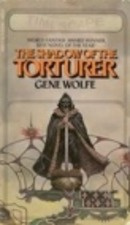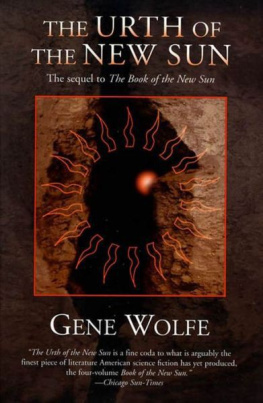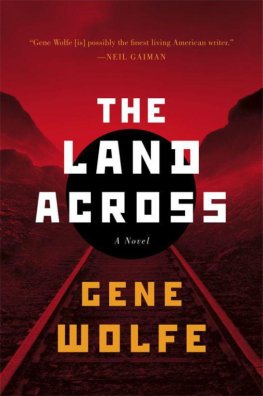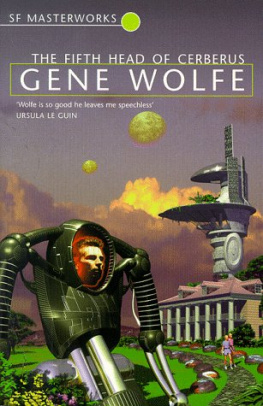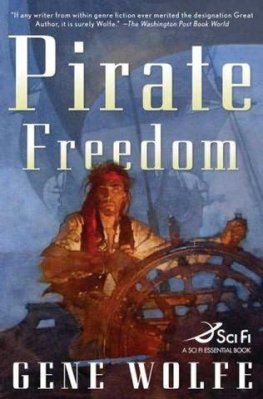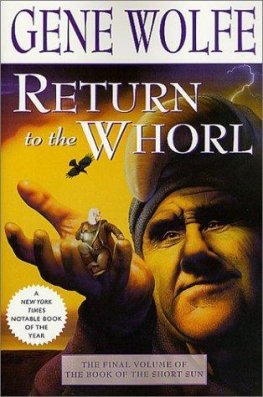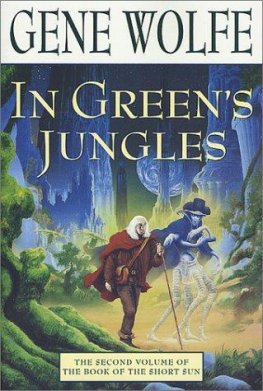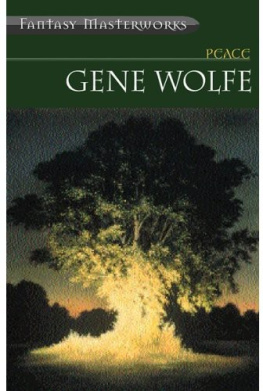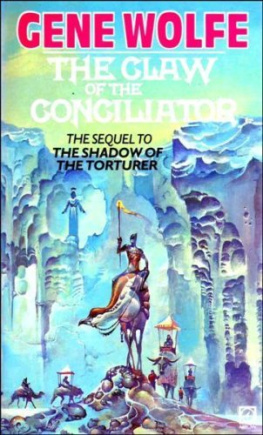Gene Wolfe - The Best of Gene Wolfe
Here you can read online Gene Wolfe - The Best of Gene Wolfe full text of the book (entire story) in english for free. Download pdf and epub, get meaning, cover and reviews about this ebook. genre: Science fiction. Description of the work, (preface) as well as reviews are available. Best literature library LitArk.com created for fans of good reading and offers a wide selection of genres:
Romance novel
Science fiction
Adventure
Detective
Science
History
Home and family
Prose
Art
Politics
Computer
Non-fiction
Religion
Business
Children
Humor
Choose a favorite category and find really read worthwhile books. Enjoy immersion in the world of imagination, feel the emotions of the characters or learn something new for yourself, make an fascinating discovery.

- Book:The Best of Gene Wolfe
- Author:
- Genre:
- Rating:3 / 5
- Favourites:Add to favourites
- Your mark:
- 60
- 1
- 2
- 3
- 4
- 5
The Best of Gene Wolfe: summary, description and annotation
We offer to read an annotation, description, summary or preface (depends on what the author of the book "The Best of Gene Wolfe" wrote himself). If you haven't found the necessary information about the book — write in the comments, we will try to find it.
The Best of Gene Wolfe — read online for free the complete book (whole text) full work
Below is the text of the book, divided by pages. System saving the place of the last page read, allows you to conveniently read the book "The Best of Gene Wolfe" online for free, without having to search again every time where you left off. Put a bookmark, and you can go to the page where you finished reading at any time.
Font size:
Interval:
Bookmark:
The Best of Gene Wolfe
(A collection of stories.)
The Island of Doctor Death and Other Stories
Winter comes to water as well as land, though there are no leaves to fall. The waves that were a bright, hard blue yesterday under a fading sky today are green, opaque, and cold. If you are a boy not wanted in the house you walk the beach for hours, feeling the winter that has come in the night; sand blowing across your shoes, spray wetting the legs of your corduroys. You turn your back to the sea, and with the sharp end of a stick found half-buried write in the wet sand Tackman Babcock.
Then you go home, knowing that behind you the Atlantic is destroying your work.
Home is the big house on Settlers Island, but Settlers Island, so called, is not really an island and for that reason is not named or accurately delineated on maps. Smash a barnacle with a stone and you will see inside the shape from which the beautiful barnacle goose takes its name. There is a thin and flaccid organ which is the gooses neck and the molluscs siphon, and a shapeless body with tiny wings. Settlers Island is like that.
The goose neck is a strip of land down which a county road runs. By whim, the mapmakers usually exaggerate the width of this and give no information to indicate that it is scarcely above the high tide. Thus Settlers Island appears to be a mere protuberance on the coast, not requiring a nameand since the village of eight or ten houses has none, nothing shows on the map but the spider line of road terminating at the sea.
The village has no name, but home has two: a near and a far designation. On the island, and on the mainland nearby, it is called the Seaview place because in the earliest years of the century it was operated as a resort hotel. Mama calls it The House of 31 February, and that is on her stationery and is presumably used by her friends in New York and Philadelphia when they do not simply say Mrs. Babcocks. Home is four floors high in some places, less in others, and is completely surrounded by a veranda; it was once painted yellow, but the paintoutsideis mostly gone now and The House of 31 February is gray.
Jason comes out the front door with the little curly hairs on his chin trembling in the wind and his thumbs hooked in the waistband of his Levis. Come on; youre going into town with me. Your mother wants to rest.
Hey tough! Into Jasons Jaguar, feeling the leather upholstery soft and smelly; you fall asleep.
Awake in town, bright lights flashing in the car windows. Jason is gone and the car is growing cold; you wait for what seems a long time, looking out at the shop windows, the big gun on the hip of the policeman who walks past, the lost dog who is afraid of everyone, even you when you tap the glass and call to him.
Then Jason is back with packages to put behind the seat. Are we going home now?
He nods without looking at you, arranging his bundles so they wont topple over, fastening his seat belt.
I want to get out of the car.
He looks at you.
I want to go in a store. Come on, Jason.
Jason sighs. All right, the drugstore over there, okay? Just for a minute.
The drugstore is as big as a supermarket, with long, bright aisles of glassware and notions and paper goods. Jason buys fluid for his lighter at the cigarette counter, and you bring him a book from a revolving wire rack. Please, Jason?
He takes it from you and replaces it in the rack, then when you are in the car again takes it from under his jacket and gives it to you.
It is a wonderful book, thick and heavy, with the edges of the pages tinted yellow. The covers are glossy stiff cardboard, and on the front is a picture of a man in rags fighting a thing partly like an ape and partly like a man, but much worse than either. The picture is in color, and there is real blood on the ape-thing; the man is muscular and handsome, with tawny hair lighter than Jasons and no beard.
You like that?
You are out of town already, and without the streetlights its too dark in the car, almost, to see the picture. You nod.
Jason laughs. Thats camp. Did you know that?
You shrug, riffling the pages under your thumb, thinking of reading, alone, in your room tonight.
You going to tell your mom how nice I was to you?
Uh-huh, sure. You want me to?
Tomorrow, not tonight. I think shell be asleep when we get back. Dont you wake her up. Jasons voice says he will be angry if you do.
Okay.
Dont come in her room.
Okay.
The Jaguar says hutntntaaa . . . down the road, and you can see the whitecaps in the moonlight now, and the driftwood pushed just off the asphalt.
You got a nice, soft mommy, you know that? When I climb on her its just like being on a big pillow.
You nod, remembering the times when, lonely and frightened by dreams, you have crawled into her bed and snuggled against her soft warmthbut at the same time angry, knowing Jason is somehow deriding you both.
Home is silent and dark, and you leave Jason as soon as you can, bounding off down the hall and up the stairs ahead of him, up a second, narrow, twisted flight to your own room in the turret.
I had this story from a man who was breaking his word in telling it. How much it has suffered in his handsI should say in his mouth, ratherI cannot say. In essentials it is true, and I give it to you as it was given to me. This is the story he told.
Captain Phillip Ransom had been adrift, alone, for nine days when he saw the island. It was already late evening when it appeared like a thin line of purple on the horizon, but Ransom did not sleep that night. There was no feeble questioning in his wakeful mind concerning the reality of what he had seen; he had been given that one glimpse and he knew. Instead his brain teemed with facts and speculations. He knew he must be somewhere near New Guinea, and he reviewed mentally what he knew of the currents in these waters and what he had learned in the past nine days of the behavior of his raft. The island when he reached ithe did not allow himself to ifwould in all probability be solid jungle a few feet back from the waters edge. There might or might not be natives, but he brought to mind all he could of the Bazaar Malay and Tagalog he had acquired in his years as a pilot, plantation manager, white hunter, and professional fighting man in the Pacific.
In the morning he saw that purple shadow on the horizon again, a little nearer this time and almost precisely where his mental calculations had told him to expect it. For nine days there had been no reason to employ the inadequate paddles provided with the raft, but now he had something to row for. Ransom drank the last of his water and began stroking with a steady and powerful beat which was not interrupted until the prow of his rubber craft ground into beach sand.
* * *Morning. You are slowly awake. Your eyes feel gummy, and the light over your bed is still on. Downstairs there is no one, so you get a bowl and milk and puffed, sugary cereal out for yourself and light the oven with a kitchen match so that you can eat and read by its open door. When the cereal is gone you drink the sweet milk and crumbs in the bottom of the bowl and start a pot of coffee, knowing that will please Mother. Jason comes down, dressed but not wanting to talk; drinks coffee and makes one piece of cinnamon toast in the oven. You listen to him leave, the stretched buzzing of his car on the road, then go up to Mothers room.
She is awake, her eyes open looking at the ceiling, but you know she isnt ready to get up yet. Very politely, because that minimizes the chances of being shouted at, you say, How are you feeling this morning, Mama?
She rolls her head to look. Strung out. What time is it, Tackie?
You look at the little folding clock on her dresser. Seventeen minutes after eight.
Font size:
Interval:
Bookmark:
Similar books «The Best of Gene Wolfe»
Look at similar books to The Best of Gene Wolfe. We have selected literature similar in name and meaning in the hope of providing readers with more options to find new, interesting, not yet read works.
Discussion, reviews of the book The Best of Gene Wolfe and just readers' own opinions. Leave your comments, write what you think about the work, its meaning or the main characters. Specify what exactly you liked and what you didn't like, and why you think so.


